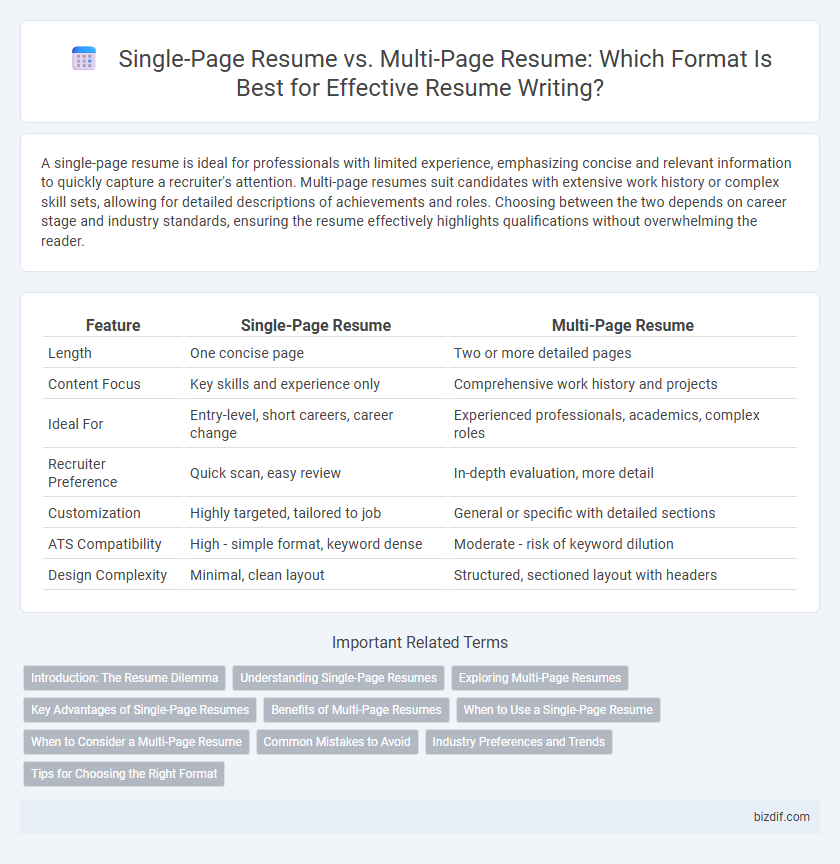A single-page resume is ideal for professionals with limited experience, emphasizing concise and relevant information to quickly capture a recruiter's attention. Multi-page resumes suit candidates with extensive work history or complex skill sets, allowing for detailed descriptions of achievements and roles. Choosing between the two depends on career stage and industry standards, ensuring the resume effectively highlights qualifications without overwhelming the reader.
Table of Comparison
| Feature | Single-Page Resume | Multi-Page Resume |
|---|---|---|
| Length | One concise page | Two or more detailed pages |
| Content Focus | Key skills and experience only | Comprehensive work history and projects |
| Ideal For | Entry-level, short careers, career change | Experienced professionals, academics, complex roles |
| Recruiter Preference | Quick scan, easy review | In-depth evaluation, more detail |
| Customization | Highly targeted, tailored to job | General or specific with detailed sections |
| ATS Compatibility | High - simple format, keyword dense | Moderate - risk of keyword dilution |
| Design Complexity | Minimal, clean layout | Structured, sectioned layout with headers |
Introduction: The Resume Dilemma
Choosing between a single-page resume and a multi-page resume depends on the applicant's experience level and industry standards. Single-page resumes are ideal for entry-level candidates or professionals with limited experience, offering concise and impactful summaries that capture key skills and achievements quickly. Multi-page resumes suit senior-level professionals with extensive experience, allowing detailed descriptions of roles, projects, and accomplishments to showcase depth and expertise.
Understanding Single-Page Resumes
Single-page resumes condense key professional achievements and skills into a clear, concise format ideal for quick recruiter evaluation. They prioritize relevance, highlighting core competencies and recent experience to maintain reader engagement within a limited space. This format is especially effective for candidates with under 10 years of experience or those targeting roles requiring succinct information presentation.
Exploring Multi-Page Resumes
Multi-page resumes allow for detailed descriptions of extensive work experience, skills, and accomplishments, providing a comprehensive view for recruiters. They are ideal for professionals with over 10 years of experience or those with diverse roles requiring in-depth explanation. Well-structured multi-page resumes use clear headings and concise language to maintain readability and highlight critical qualifications effectively.
Key Advantages of Single-Page Resumes
Single-page resumes offer concise presentation, enabling recruiters to quickly scan essential qualifications and achievements without sifting through excessive information. Their format encourages prioritization of relevant skills and experience, enhancing clarity and impact in competitive job markets. This efficiency often results in higher readability, increased recruiter engagement, and improved chances of securing an interview.
Benefits of Multi-Page Resumes
Multi-page resumes provide extensive space to detail a candidate's comprehensive work history, skills, certifications, and accomplishments, making them ideal for professionals with extensive experience or multiple roles. They enable the inclusion of specialized projects, publications, or technical proficiencies that may be crucial for senior or technical positions. Recruiters gain a deeper understanding of a candidate's qualifications, leading to more informed hiring decisions when reviewing multi-page resumes.
When to Use a Single-Page Resume
A single-page resume is ideal for early-career professionals, recent graduates, or those with less than 10 years of experience, as it concisely highlights key skills and achievements without overwhelming the reader. Recruiters typically prefer a single-page format when screening large volumes of applications, making it essential for job seekers targeting competitive or entry-level positions. This format ensures all critical information is accessible at a glance, increasing the chances of capturing attention in a brief review.
When to Consider a Multi-Page Resume
Consider a multi-page resume when you have over 10 years of relevant experience or multiple job roles that showcase diverse skills and accomplishments. Industries such as academia, engineering, or executive positions often require detailed project descriptions, certifications, and publications that exceed one page. A multi-page format allows for comprehensive presentation without compromising clarity or readability, especially when tailored to complex job requirements.
Common Mistakes to Avoid
Common mistakes in resume writing include overcrowding a single-page resume with excessive details, which can overwhelm recruiters and obscure key qualifications. Conversely, using a multi-page resume without prioritizing or organizing content effectively often leads to redundancy and decreased readability. Ensuring clarity by balancing concise information on one page or well-structured details across multiple pages improves candidate presentation and increases hiring chances.
Industry Preferences and Trends
Single-page resumes are preferred in creative and technology industries where concise, impactful information is valued for quick screening, while multi-page resumes are common in academic, scientific, and executive roles requiring detailed achievements and publications. Recruiters in fast-paced sectors favor brevity, often limiting review time to seconds, making single-page formats advantageous for entry-level or mid-career candidates. Trends indicate a growing acceptance of multi-page resumes in senior positions where comprehensive experience documentation supports credibility and expertise validation.
Tips for Choosing the Right Format
Selecting the right resume format depends on your career stage and industry; single-page resumes excel for recent graduates or professionals with less experience, emphasizing concise and relevant achievements. Multi-page resumes suit senior-level candidates or those with extensive work histories, providing space to detail accomplishments and specialized skills. Tailor the format to highlight key qualifications, ensuring clarity for applicant tracking systems and hiring managers.
Single-Page Resume vs Multi-Page Resume Infographic

 bizdif.com
bizdif.com